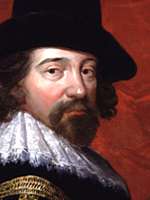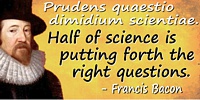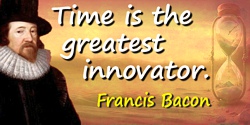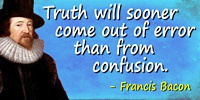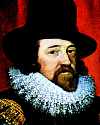 (source)
(source)
|
Sir Francis Bacon
(22 Jan 1561 - 9 Apr 1626)
English philosopher remembered for his influence promoting a scientific method. He held that the aim of scientific investigation is practical application of the understanding of nature to improve man’s condition.
|
Lord Bacon Did Not Write Shakespeare's Works
as expressed by Robert G. Ingersoll
excerpt from Lecture, 'Shakespeare' (1891)
[Webmaster’s note: This comes from a longer lecture by Robert G. Ingersoll in which he was lauding Shakespeare. Thus, it was his clear intention to discredit Lord Bacon. You may draw your own conclusion as to whether the rhetoric is unduly harsh. However, it does provide some balance to the more customary reverential accounts of Francis Bacon’s scientific acumen. So, you may find it thought proving to read this view of Bacon. Ingersoll was a popular orator, nicknamed “The Great Agnostic” for his criticism of the Bible, and he made other speeches in which he speaks up for science versus superstition.]
[p.22] THE plays of Shakespeare show so much knowledge, thought and learning, that many people —those who imagine that universities furnish capacity — contend that Bacon must have been the author.
We know Bacon. We know that he was a scheming politician, a courtier, a time-server of church and king, and a corrupt judge. We know that he never admitted the truth of the Copernican system—that he was doubtful whether instruments were of any advantage in scientific investigation — that he was ignorant of the higher branches of mathematics, and that, as a matter of fact, he added but little to the knowledge of the world. When he was more than sixty years of age he turned his attention to poetry, and dedicated his verses to George Herbert.
If you will read these verses you will say that the author of “Lear” and “Hamlet” did not write them.
Bacon dedicated his work on the Advancement of Learning, Divine and Human, to James I., and in his dedication he stated that there had not been, since the time of Christ, any king or monarch so learned in all erudition. divine or human. He placed James the First before Marcus Aurelius [p.23] all other kings and emperors since Christ, and concluded by saying that James the First had “the power and fortune of a king, the illumination of a priest, the learning and universality of a philosopher.” This was written of James the First, described by Macaulay as a “stammering, slobbering, trembling coward, whose writings were deformed by the grossest and vilest superstitions — witches being the special objects of his fear, his hatred, and his persecution.”
It seems to have been taken for granted that if Shakespeare was not the author of the great dramas, Lord Bacon must have been.
It has been claimed that Bacon was the greatest philosopher of his time. And yet in reading his works we find that there was in his mind a strange mingling of foolishness and philosophy. He takes pains to tell us, and to write it down for the benefit of posterity, that “ snow is colder than water, because it hath more spirit in it, and that quicksilver is the coldest of all metals, because it is the fullest of spirit.”
He stated that he hardly believed that you could contract air by putting opium on top of the weather glass, and gave the following reason :
[p.24] “I conceive that opium and the like make spirits fly rather by malignity than by cold.”
This great philosopher gave the following recipe for staunching blood :
“Thrust the part that bleedeth into the body of a capon, new ripped and bleeding. This will staunch the blood. The blood, as it seemeth, sucking and drawing up by similitude of substance the blood it meeteth with, and so itself going back.”
The philosopher also records this important fact :
“ Divers witches among heathen and Christians have fed upon man’s flesh to aid, as it seemeth, their imagination with high and foul vapors.”
Lord Bacon was not only a philosopher, but he was a biologist, as appears from the following:
“As for living creatures, it is certain that their vital spirits are a substance compounded of an airy and flamy matter, and although air and flame being free will not mingle, yet bound in by a body that hath some fixing, will.”
Now and then the inventor of deduction reasons by analogy. He says :
“As snow and ice holpen, and their cold activated by nitre or salt, will turn water into ice, so it may be it will turn wood or stiff clay into stone.”
[p.25] Bacon seems to have been a believer in the transmutation of metals, and solemnly gives a formula for changing silver or copper into gold. He also believed in the transmutation of plants, and had arrived at such a height in entomology that he informed the world that “ insects have no blood.”
It is claimed that he was a great observer, and as evidence of this he recorded the wonderful fact that “tobacco cut and dried by the fire loses weight;” that “bears in the winter wax fat in sleep, though they eat nothing;” that “tortoises have no bones;” that “there is a kind of stone, if ground and put in water where cattle drink, the cows will give more milk;” that “it is hard to cure a hurt in a Frenchman’s head, but easy in his leg; that it is hard to cure a hurt in an Englishman’s leg, but easy in his head;” that “wounds made with brass weapons are easier to cure than those made with iron;” that “lead will multiply and increase, as in statues buried in the ground;” and that “the rainbow touching anything causeth a sweet smell.”
Bacon seems also to have turned his attention to ornithology, and says that “eggs laid in the full of the moon breed better birds,” and that “you can make swallows white by putting ointment on the eggs before they are hatched.”
[p.26] He also informs us “ that witches cannot hurt kings as easily as they can common people;” that “perfumes dry and strengthen the brain;” that “any one in the moment of triumph can be injured by another who casts an envious eye, and the injury is greatest when the envious glance comes from the oblique eye.”
Lord Bacon also turned his attention to medicine, and he states that “ bracelets made of snakes are good for curing cramps;” that “the skin of a wolf might cure the colic, because a wolf has great digestion ;” that “eating the roasted brains of hens and hares strengthens the memory;” that “if a woman about to become a mother eats a good many quinces and considerable coriander seed, the child will be ingenious,” and that “the moss which groweth on the skull of an unburied dead man is good for staunching blood.”
He expresses doubt, however, “as to whether you can cure a wound by putting ointment on the weapon that caused the wound, instead of on the wound itself.”
It is claimed by the advocates of the Baconian theory that their hero stood at the top of science; and yet “it is absolutely certain that he was ignorant [p.27] of the law of the acceleration of falling bodies, although the law had been made known and printed by Galileo thirty years before Bacon wrote upon the subject. Neither did this great man understand the principle of the lever. He was not acquainted with the precession of the equinoxes, and as a matter of fact was ill-read in those branches of learning in which, in his time, the most rapid progress had been made.”
After Kepler discovered his third law, which was on the 15th of May, 1618, Bacon was more than ever opposed to the Copernican system. This great man was far behind his own time, not only in astronomy, but in mathematics. In the preface to the “Descriptio Globi Intellectualis,” it is admitted either that Bacon had never heard of the correction of the parallax, or was unable to understand it. He complained on account of the want of some method for shortening mathematical calculations; and yet “Napier’s Logarithms” had been printed nine years before the date of his complaint.
He attempted to form a table of specific gravities by a rude process of his own, a process that no one has ever followed ; and he did this in spite of the fact that a far better method existed.
[p.28] We have the right to compare what Bacon wrote with what it is claimed Shakespeare produced. I call attention to one thing — to Bacon’s opinion of human love. It is this :
“The stage is more beholding to love than the life of man. As to the stage, love is ever matter of comedies and now and then of tragedies, but in life it doth much mischief — sometimes like a siren, sometimes like a fury. Amongst all the great and worthy persons there is not one that hath been transported to the mad degree of love, which shows that great spirits and great business do keep out this weak passion.”
The author of “Romeo and Juliet” never wrote that.
It seems certain that the author of the wondrous Plays was one of the noblest of men.
Let us see what sense of honor Bacon had.
In writing commentaries on certain passages of Scripture, Lord Bacon tells a courtier, who has committed some offence, how to get back into the graces of his prince or king. Among other things he tells him not to appear too cheerful, but to assume a very grave and modest face; not to bring the matter up himself; to be extremely industrious, so that the [p.29] prince will see that it is hard to get along without him; also to get his friends to tell the prince or king how badly he, the courtier, feels ; and then he says, all these failing, “let him contrive to transfer the fault to others.”
It is true that we know but little of Shakespeare, and consequently do not positively know that he did not have the ability to write the Plays — but we do know Bacon, and we know that he could not have written these Plays — consequently, they must have been written by a comparatively unknown man — that is to say, by a man who was known by no other writings. The fact that we do not know Shakespeare, except through the Plays and Sonnets, makes it possible for us to believe that he was the author.
Some people have imagined that the Plays were written by several — but this only increases the wonder, and adds a useless burden to credulity.
Bacon published in his time all the writings that he claimed. Naturally, he would have claimed his best. Is it possible that Bacon left the wondrous children of his brain on the door-step of Shakespeare, and kept the deformed ones at home? Is it possible that he fathered the failures and deserted the perfect?
[p.30] Of course, it is wonderful that so little has been found touching Shakespeare — but is it not equally wonderful, if Bacon was the author, that not a line has been found in all his papers, containing a suggestion, or a hint, that he was the writer of these Plays? Is it not wonderful that no fragment of any scene — no line — no word — has been found ?
Some have insisted that Bacon kept the authorship secret because it was disgraceful to write Plays. This argument does not cover the Sonnets — and besides, one who had been stripped of the robes of office for receiving bribes as a judge, could have borne the additional disgrace of having written “Hamlet.” The fact that Bacon did not claim to be the author, demonstrates that he was not. Shakespeare claimed to be the author, and no one in his time or day denied the claim. This demonstrates that he was.
Bacon published his works, and said to the world: This is what I have done.
Suppose you found in a cemetery a monument erected to John Smith, inventor of the Smith-churn, and suppose you were told that Mr. Smith provided for the monument in his will, and dictated the inscription— would it be possible to convince you [p.31] that Mr. Smith was also the inventor of the locomotive and telegraph?
Bacon’s best can be compared with Shakespeare’s common, but Shakespeare’s best rises above Bacon’s best, like a domed temple above a beggar’s hut.
- Science Quotes by Sir Francis Bacon.
- 22 Jan - short biography, births, deaths and events on date of Bacon's birth.
- The Relation Of Bacon To Modern Science And Civilization - Letter to the Editor Of The Index (1878)
- Novum Organum: With Other Parts of the Great Instauration by Francis Bacon, by Peter Urbach. (Ed.) and John Gibson (Ed.). - book suggestion.
